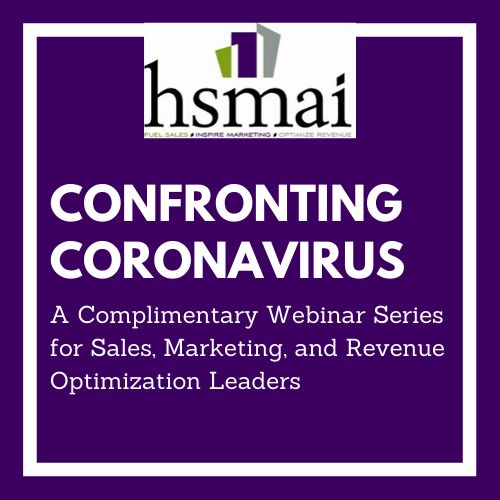By Kaitlin Dunn, Writer, Hospitality Sales and Marketing International (HSMAI)
 Hoteliers find themselves in an unknown environment as the coronavirus continues to spread and the situation evolves, creating a challenge when it comes to communicating with clients, partners, and other stakeholders. Laura Guitar, executive vice president and partner at rbb Communications, and Chris Davidson, executive vice president of insights and strategy at MMGY Global, shared their perspectives and tips for hospitality marketing professionals as part of a program in HSMAI’s Confronting Coronavirus webinar series called “Crisis Communication and Marketing Expert Insights” on March 12. Here are key takeaways from their presentation:
Hoteliers find themselves in an unknown environment as the coronavirus continues to spread and the situation evolves, creating a challenge when it comes to communicating with clients, partners, and other stakeholders. Laura Guitar, executive vice president and partner at rbb Communications, and Chris Davidson, executive vice president of insights and strategy at MMGY Global, shared their perspectives and tips for hospitality marketing professionals as part of a program in HSMAI’s Confronting Coronavirus webinar series called “Crisis Communication and Marketing Expert Insights” on March 12. Here are key takeaways from their presentation:
1. We are not overreacting as an industry. This is one of the most common questions that Davidson has been getting. The reality, he said, is that hospitality professionals have no idea how many people are already infected or how many asymptomatic people are walking around. “The reaction is appropriate,” he said. “It’s our responsibility to mitigate the impact.”
But because no one knows what’s going to happen, it’s hard to predict when things will bounce back. “How quickly we come out of this,” Davidson said, “is dependent on how widespread it becomes.”
2. Hotels have a responsibility to provide clear, accurate information. This, Guitar said, is difficult in an age when, despite all the news sources that are available, many people don’t trust the government or media — plus there is so much misinformation out there. Because hospitality marketing professionals aren’t scientists, it’s more important to point clients to the most reliable sources you can find, such as the World Health Organization or the Center for Disease Control, rather than spreading information yourself.
3. It’s important to have a crisis plan. Such a plan shouldn’t cover every single situation in detail, but rather should define the process that will guide decisions being made in high-pressure circumstances, Guitar said. Davidson added that crisis plans should include a chain of command for both getting and disseminating information. It’s also important to create a post-coronavirus toolkit, with plans and programs that can be used to target audiences when the crisis is over.
4. Focus on the business. This crisis is likely going to last at least six to eight weeks before it peaks, Davidson said. Therefore, it’s important not to let the issue absorb everyone’s time and thinking, but rather create a team of people to do that, so that others can focus on keeping the business running. “If you lose sight of the business, you’re going to have to rebuild on the other side,” Davidson said. “This is a marathon, not a sprint.”
5. There are still opportunities to pursue. Both Guitar and Davidson recommended pushing the idea of staycations, where people can feel as if they’re getting away by staying in a hotel in their own town. “The idea is hometown support and rallying around our community,” Guitar said. Davidson also recommended targeting road trippers, who could get to hotels without risking being exposed to the virus in airports.
For island destinations, Guitar said that more people are afraid of getting the virus on a plane than at a resort. She recommended partnering with an airline and promoting all the cleaning and sterilizing that planes are undergoing after every flight. “Planes might actually be the cleanest places in the country right now,” Guitar said.
Watch the entire HSMAI Confronting Coronavirus webinar “Crisis Communication and Marketing Expert Insights” here. For additional information, insights, and tools, visit HSMAI’s Global Coronavirus Resources hub.
